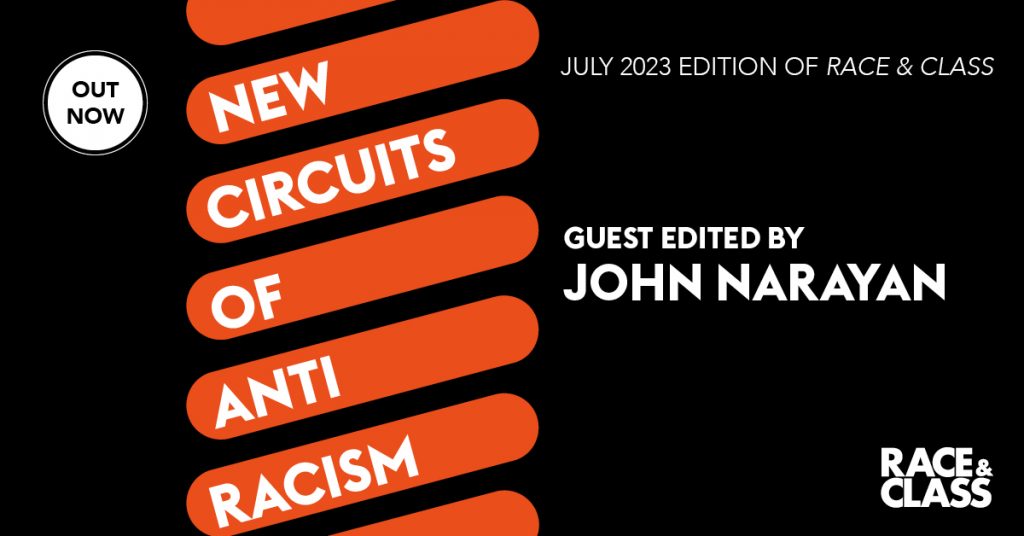Fifty years ago, the Institute of Race Relations overturned ‘race relations’ orthodoxies and set parameters for a committed anti-racism. Fifty years on, the IRR, with radical scholar activists, examined ‘New Circuits of Anti-Racism’ at a conference gathering. The July 2023 special issue of Race & Class, guest-edited by the IRR’s new Chair John Narayan, brings together key contributions from that gathering – and beyond – highlighting debates on abolition, reparations, internationalism and racial capitalism.
Abolition and institutional racism
The issue features an edited keynote conversation between Barbara Ransby and Derecka Purnell, two of the most important Black feminist abolitionists in the US, who outline the entangled workings of capitalism, racism and patriarchy, and how trans and queer activists are shaping visions for liberation. One of the key analysts of police racism Adam Elliott-Cooper shows the interconnections between UK abolitionism in the present day with Black Power politics and anti-colonialism in the twentieth century, calling into question the failings of liberal anti-racism and the reluctance of authorities to accept the existence of institutional racism.
Resistance and fightback
The myriad ways in which communities are fighting back is the topic of an edited roundtable discussion with five UK-based anti-racist activist authors, Shanice Octavia McBean, Azfar Shafi, Ilyas Nagdee, Remi Joseph-Salisbury and Laura Connelly. Their wide-ranging contributions cover issues including the diffusion of police powers, the cause of scholar-activism and the role of radical histories in building communities of resistance.
Internationalism and imperialism
Communities of resistance, as well as being rooted locally, must also build solidarity on a transnationally level. Researcher Akram Salhab explores the radical possibilities of internationalism in the metropole today, looking at London historically when the city was a hotbed of progressive internationalism. Avery Gordon takes stock of shifts in the global order that have produced challenging conditions of debt, austerity, capitalist crisis and authoritarianisms, and asks how to build radical internationalism today. Some answers are provided by John Narayan, who recalls Sivanandan’s political economy which anchors anti-racism to an anti-imperial international political economy, which, he argues, must be at the heart of how contemporary anti-racism addresses the current crisis.
The influence of Sivanandan
The influence of A. Sivanandan, founder of this journal and key mover in the reorientation of ‘race thinking’ in the UK, is a central thread woven throughout the special issue, with contributors using his work to understand the present moment. Anthropologist Miriyam Aouragh returns to Sivanandan’s writing and her own notion of ‘radical kinship’ in order to explore how to organise together and build on commonalities. And Tamil fiction writer Priya Guns reflects on how Sivanandan’s literary work has shaped her pursuit to make radical art in a neoliberal globalist world.
New conditions may suggest the need of ‘new circuits’, but these can build on lessons of the past. Framing this issue are reflections from Race & Class Joint Editor Jenny Bourne and former IRR chair and film-maker Colin Prescod, who mark fifty years since the radical reorientation of the IRR in 1972, providing a roadmap for revolutionary transformation.
Accompanying this special issue, readers can listen to an exclusive series of podcasts, produced by Surviving Society and watch each IRR50 session from our conference via Youtube.
Editorial by John Narayan
IRR50
IRR50 and the revolutionary act: ‘We are here to recommit’ by Jenny Bourne and Colin Prescod
Influence of A. Sivanandan
New Times or new circuits: recovering Sivanandan’s political economy by John Narayan
From memory to a re-imagining; learning from Sivanandan by Priya Guns
Towards a theory of radical kinship by Miriyam Aouragh
Internationalism
Radical internationalism and shifts in the global order by Avery F. Gordon
Stitching together the threads of internationalism: London in anti-imperial organising by Akram Salhab
Does the US owe reparations to Somalia? by Jason C. Mueller
Abolition and policing
Connecting the dots in systems of domination and violence: a conversation by Barbara Ransby and Derecka Purnell
Abolishing institutional racism by Adam Elliott-Cooper
UK anti-racism today
Anti-racist organising today: a roundtable discussion by Sophia Siddiqui

